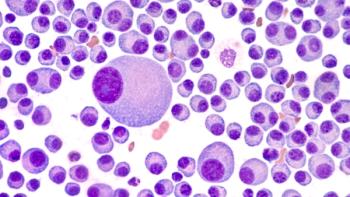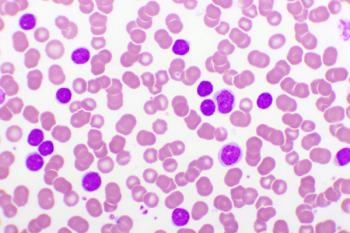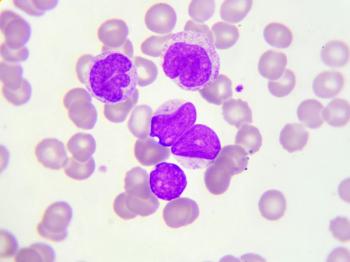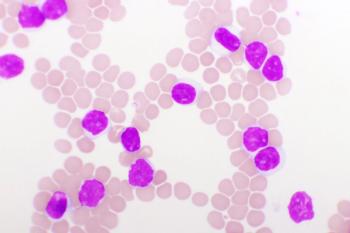Articles by Matthew Fowler

The American Cancer Society Cancer Action Network partnered with the National Comprehensive Cancer Network and the National Minority Quality Forum to produce recommendations addressing issues regarding health equity and disparities among minority patients with cancer.

A study from JAMA Oncology investigated the association between BRCA1/2 pathogenic variants and risk-reducing salpingo-oophorectomy for breast cancer, concluding that a benefit exists for women in the immediate 5 years post-surgery.

Research investigating the highly selective, reversible BTK inhibitor pirtobrutinib found the drug was safe and active for treating patients with chronic lymphocytic leukemia as well as other B-cell malignancies.

CancerNetwork® spoke with Nikki Martin of the LUNGevity Foundation regarding the “No One Missed” campaign working to provide education and awareness to patients with lung cancer.

Mehmet Sitki Copur, MD, discussed his article in the Journal ONCOLOGY® focusing on COVID-19, messenger RNA vaccines, and the excitement surrounding its integration into the future of cancer treatment.

Take a look back at some of the important news and notes from last week in the world of oncology, featuring news about prostate cancer, breast cancer, precision medicine, and gynecologic cancers.

Data from JAMA Oncology concluded that patients with a high BMI treated with PD-1/PD-L1–based immune checkpoint inhibitors for mRCC have higher overall survival rates than those with a low BMI.

Data from The Lancet Oncology found that higher-dose radiotherapy of 60 Gy for patients with small cell lung cancer resulted in survival benefit while maintaining the toxicity profile compared with a radiotherapy at a dose of 45 Gy.

A presentation from the Society of Gynecologic Oncology 2021 Virtual Annual Meeting on Women’s Cancer highlighted data investigating the combination of ixabepilone and bevacizumab compared with ixabepilone monotherapy.

Data presented at the Society of Gynecologic Oncology 2021 Annual Meeting on Women’s Cancer found a statistically significant benefit with fuzuloparib maintenance therapy compared with placebo for patients with platinum-sensitive, recurrent ovarian cancer.

GT Biopharma announced updated data focusing on its therapeutic candidate, GTB-3550, to treat certain patients with myelodysplastic syndromes and acute myeloid leukemia.

Pyrotinib plus capecitabine to treat patients with HER2-positive metastatic breast cancer saw a statistically significant improvement in progression-free survival.

Children, adolescents, and young adult patients in first B-cell acute lymphoblastic leukemia relapse did not experience a statistically significant disease-free survival benefit with blinatumomab treatment compared with chemotherapy.

Adjuvant immunotherapy treatment was associated with a significant survival benefit for patients with stage II melanoma in a study presented at the Society of Surgical Oncology 2021 International Conference on Surgical Cancer Care.

Take a look back at some of the important news and notes from last week in the world of oncology, featuring news about breast cancer, prostate cancer, molecular profiling, ovarian cancer, and more.

Compugen announced updated data surrounding the investigational therapeutic antibody, COM701, as monotherapy and in combination with nivolumab.

Data presented at the Society of Surgical Oncology 2021 International Conference on Surgical Cancer Care found that breast pCR was predictive of nodal pCR for patients with HER2-positive and triple-negative breast cancer treated with chemotherapy.

Exelixis recently announced that cabozantinib received a breakthrough therapy designation from the FDA based on data from the COSMIC-311 trial for the treatment of differentiated thyroid cancer.

“As the first AML trial to use MRD negative CR as a primary endpoint, our trial is breaking new ground that may help deliver effective, targeted therapies more expeditiously to patients living with this devastating disease,” Bischofberger said.

The latest episode of the podcast dissects a piece of original research from the Journal ONCOLOGY focusing on the impact of treatment refusal on patients with small cell lung cancer.

Take a look back at some of the important news and notes from last week in the world of oncology, featuring news about breast cancer, prostate cancer, and urothelial cancer.

The new combination treatment of ublituximab plus ibrutinib resulted in a higher overall response rate and a tolerable safety profile for patients with relapsed or refractory high-risk CLL.

Combination chemotherapy treatment followed by individualized PET4-guided therapy allowed some patients with unfavorable Hodgkin lymphoma to forego radiotherapy while maintaining efficacy.

A bevacizumab-plus-chemotherapy combination improved progression-free survival for a cohort of patients with recurrent platinum-sensitive ovarian cancer, suggesting the potential for a future therapeutic path in clinical practice.

These data in Nature Communications found that Black men may derive survival benefits from immunotherapy treatment.

Leonard G. Gomella, MD, FACS, detailed updated information regarding the standard of care and overall management of patients with non-muscle invasive bladder cancer at the 2021 New York GU 14th Annual Interdisciplinary Prostate Cancer Congress®.

Data on male patients with hormone receptor–positive breast cancer found treatment options that included GnRHa sustained a decrease in estradiol levels, reducing quality of life for this patient subset.

Data from the POLLUX and CASTOR trials both found higher sustained MRD-negativity rates for daratumumab combination regimens compared with the standard-of-care treatments.

The trial investigated the association of bone metastatic burden and metastasis location with overall survival and failure-free survival, suggesting the potential for these data to predict survival benefits.

Kevin Kalinsky, MD, MS, discussed a number of antibody-drug conjugates, detailing the prevailing data and potential trials that may change the treatment paradigm for patients with breast cancer.



























